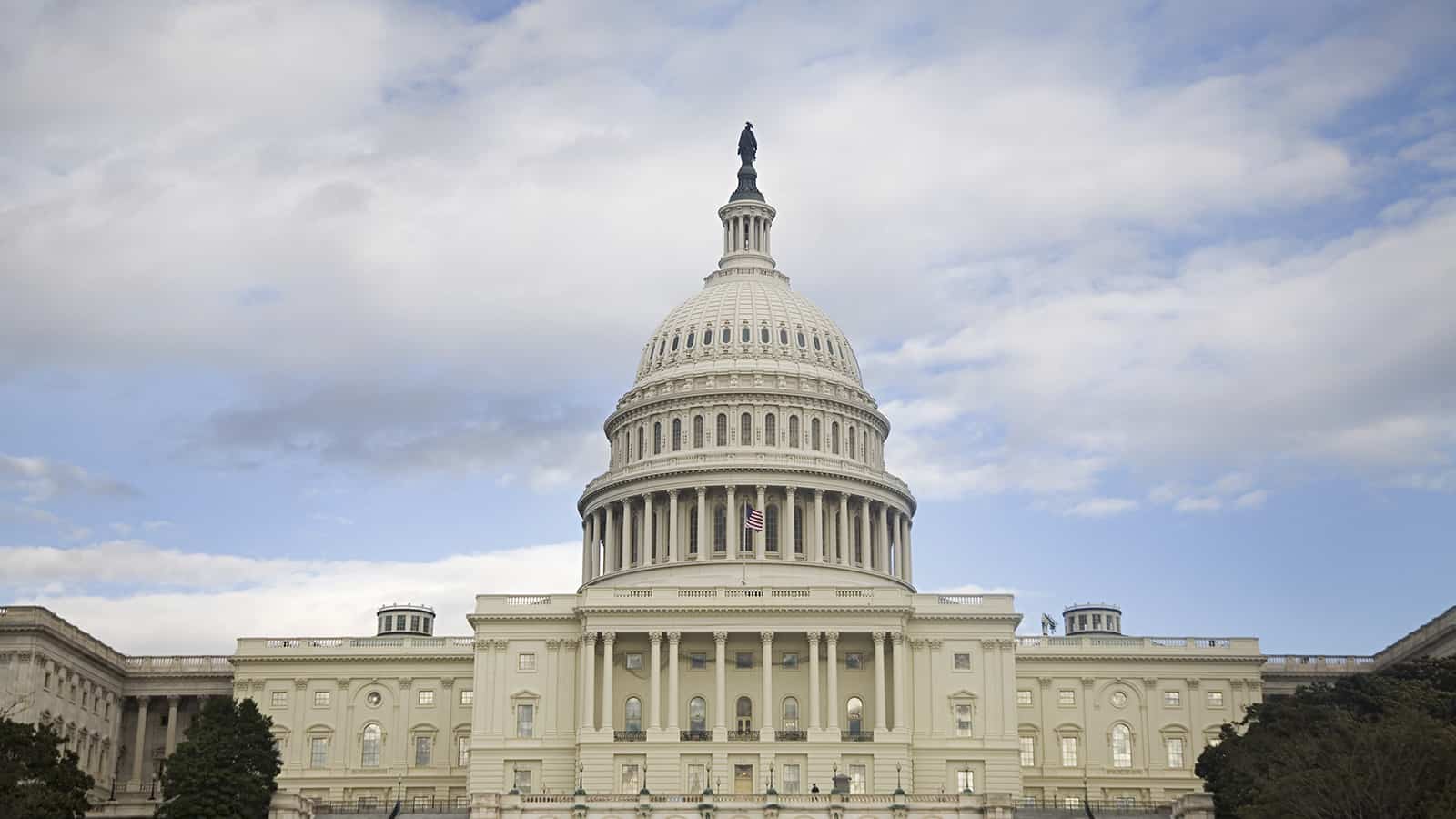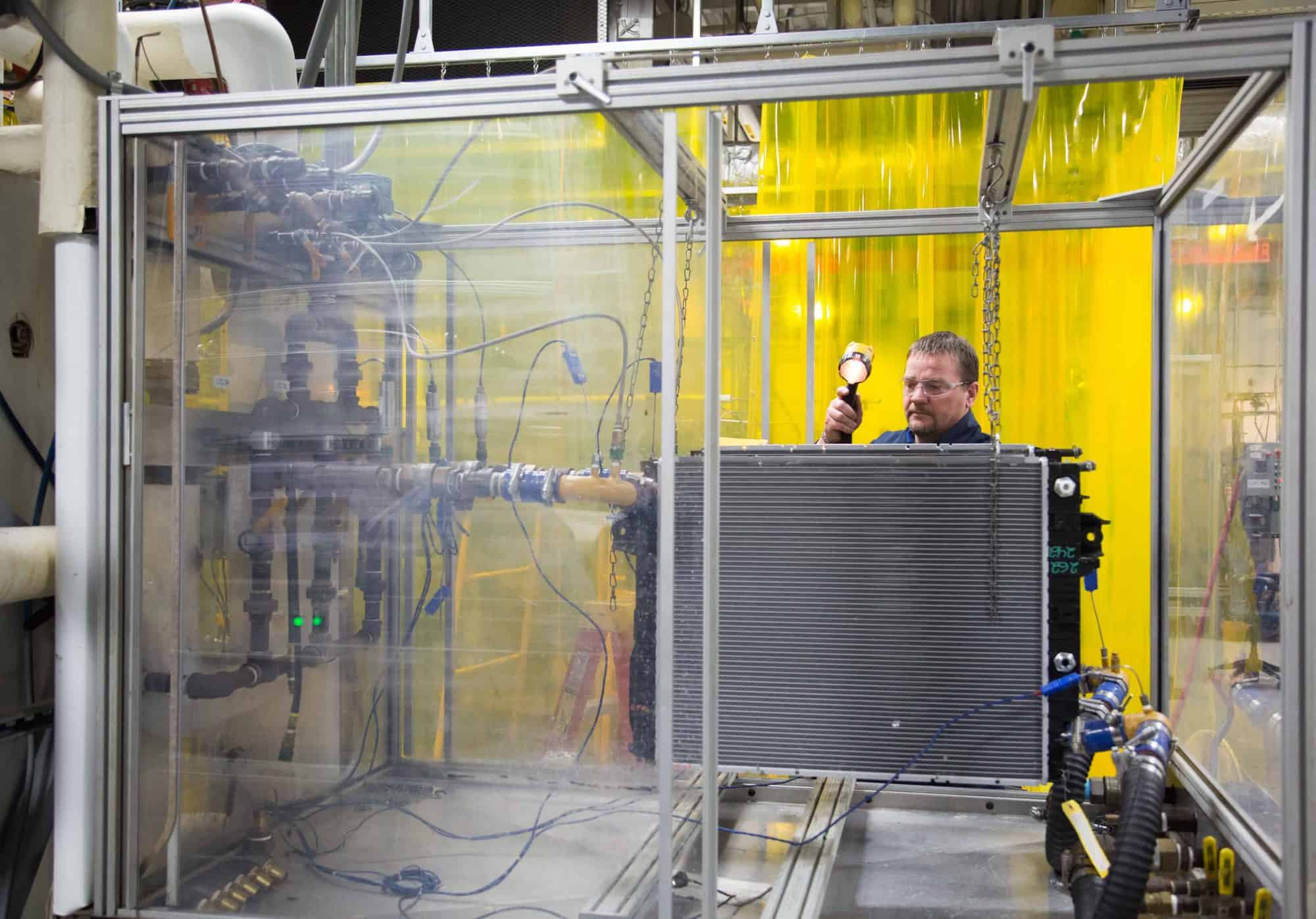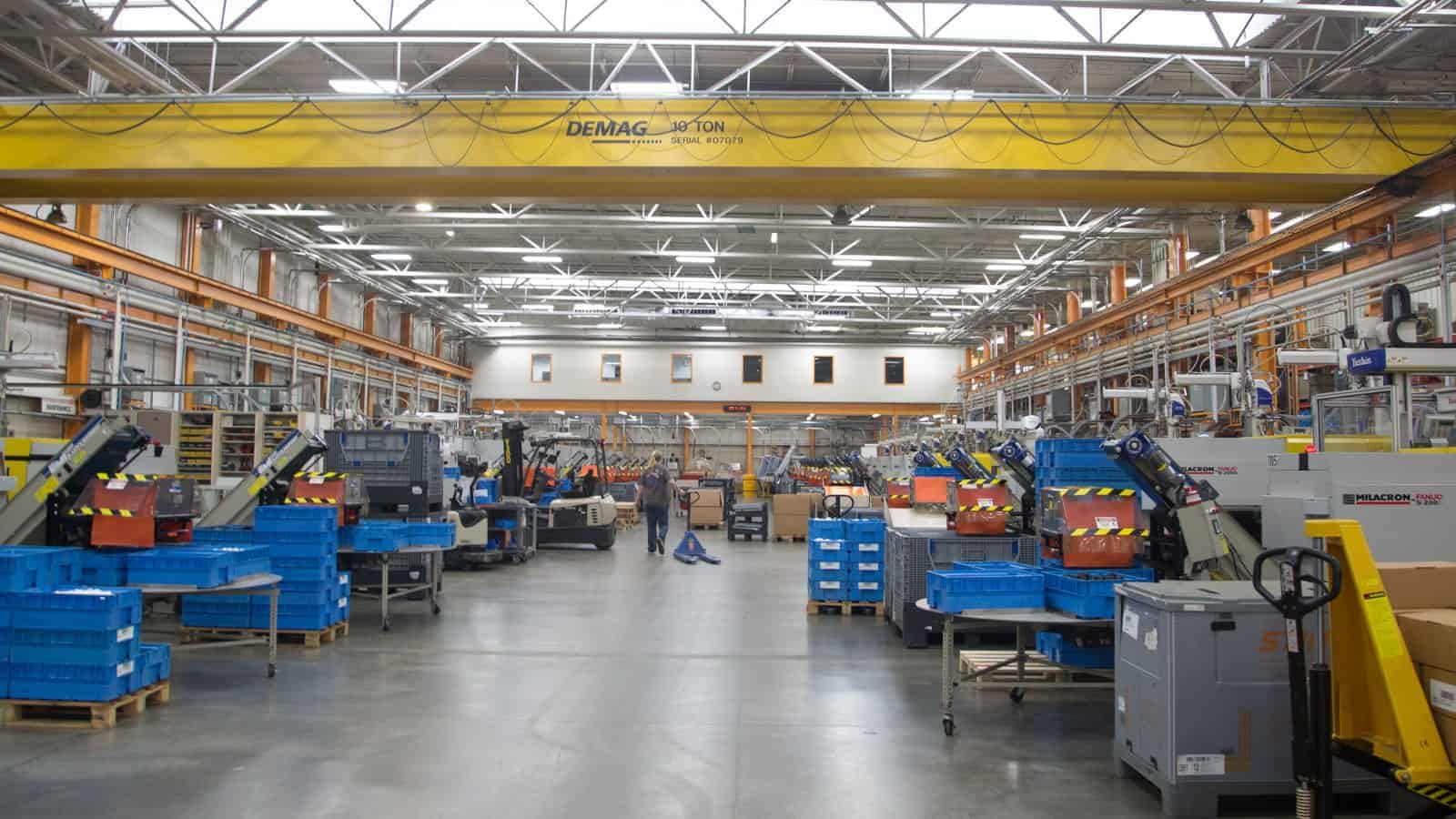Republicans Release $1 Trillion Stimulus Proposal

The next round of stimulus is in the works, with Senate Republicans releasing their proposal and Democrats meeting with White House officials yesterday, reports The Washington Post (subscription). Some highlights of the new proposal:
- Five-year COVID-19-related liability protections for businesses, health care providers and schools.
- $100 billion or more for the Paycheck Protection Program, which benefits small businesses.
- Another round of $1,200 checks for Americans and financial support for schools.
- A reduction in emergency employment benefits from $600 to $200 per week, until states can set up their own unemployment programs to pay 70% of income. (A reminder: the current benefits run out very soon.)
The NAM says: NAM Vice President of Government Relations Jordan Stoick points out some of the advantages of the plan for manufacturers:
- “Manufacturers were glad to see many of the priorities from our ‘American Renewal Action Plan’ included in this proposal, including targeted liability protections for manufacturers and other essential frontline businesses that have operated during the COVID-19 pandemic, and increased funding for the Paycheck Protection Program, which has provided critical liquidity for manufacturers.”
- “The proposal also includes more funding for testing as well as tax incentives for manufacturers that keep their employees on payroll during the COVID-19 pandemic and to help manufacturers invest in PPE and other safety measures to keep their facilities clean and their employees and customers safe.”
- “The NAM will remain fully engaged in the days ahead with members of the House and Senate to urge them to come together in a bipartisan way to finalize a plan that includes these important provisions.”
The NAM Takes Aim at Counterfeiting

Business advocates and policymakers have a new tool for waging an aggressive effort against counterfeiting during the pandemic and beyond. The NAM has released a new report, “Countering Counterfeits,” which includes proposed solutions for Congress, the administration and the private sector to pursue.
The numbers: According to the NAM’s research, fake and counterfeit products cost the United States $131 billion and 325,000 jobs in 2019 alone.
The rising tide: The rise of e-commerce has caused an explosion in fake products, particularly from China. E-commerce has created a pipeline to consumers that counterfeiters can exploit while hiding their identities and evading oversight. Estimates now indicate that global trade in counterfeits exceeds $500 billion per year.
The plan: The NAM’s proposal pushes for a series of actions to help curb counterfeiting, including:
- Requiring e-commerce platforms to reduce the availability of counterfeits;
- Modernizing enforcement laws and tactics to keep pace with counterfeiting technology;
- Streamlining government coordination to tackle counterfeit items;
- Improving private-sector collaboration; and
- Empowering consumers to avoid counterfeit goods.
The NAM says: President and CEO Jay Timmons said in his introduction to the report, “The prevalence of counterfeits in the COVID-19 response has brought new urgency to this long-simmering issue. So the National Association of Manufacturers is leading the charge against fake and counterfeit goods, bringing together diverse stakeholders and driving innovative policy solutions to address these issues once and for all and to ensure the long-term success of our sector and the safety and security of the people who rely on our products.”
Manufacturers Back Ambitious CO2 Standards for Aerospace Sector
EPA proposal strengthens the aviation industry against international competitors
Washington, D.C. – Following the EPA’s emissions standard proposal for airplanes to align U.S. standards with those set by the International Civilian Aviation Organization, NAM’s Vice President of Energy & Resources Policy Rachel Jones released the following statement:
Manufacturers are committed to smart, strong environmental protections, improving the lives of all Americans. The newest airliners are as fuel efficient as a hybrid electric car, all while making trips of a lifetime possible, and we are on the cutting edge of next-generation technologies. Modern aircraft are 80% more carbon efficient than the first airliners, and a flight today has half the carbon-footprint of the same flight in 1990. That’s why that the NAM has been pushing the EPA to set ambitious CO2 standards for the aerospace sector, to strengthen the aviation industry against international competitors, propel our economic renewal and continue leading the world in carbon reductions. We support the EPA’s proposal to set standards in line with international standards that will put the American aerospace sector in a position to continue leading on a global stage.
-NAM-
The National Association of Manufacturers is the largest manufacturing association in the United States, representing small and large manufacturers in every industrial sector and in all 50 states. Manufacturing employs more than 11.7 million men and women, contributes $2.37 trillion to the U.S. economy annually and has the largest economic multiplier of any major sector and accounts for 63% of private-sector research and development. The NAM is the powerful voice of the manufacturing community and the leading advocate for a policy agenda that helps manufacturers compete in the global economy and create jobs across the United States. For more information about the NAM or to follow us on Twitter and Facebook, please visit www.nam.org.
Manufacturers Score “Major Win” on Final SEC Proxy Advisory Firm Regulations
Washington, D.C. – National Association of Manufacturers President and CEO Jay Timmons released this statement after the Securities and Exchange Commission issued final regulations on proxy advisory firms and supplemental guidance on asset managers’ use of these firms:
“The SEC has listened to manufacturers, and this announcement is a long-sought, major win for the industry and millions of manufacturing workers,” said Timmons. “These changes will protect the retirement savings of manufacturing workers and millions more American families from proxy firms’ errors and conflicts of interests. The SEC’s actions today will reduce proxy firms’ influence on important business decisions and instead empower manufacturers to prioritize investors’ long-term best interests, allowing us to better lead our country’s recovery and renewal at this critical time.”
-NAM-
The National Association of Manufacturers is the largest manufacturing association in the United States, representing small and large manufacturers in every industrial sector and in all 50 states. Manufacturing employs more than 11.7 million men and women, contributes $2.37 trillion to the U.S. economy annually and has the largest economic multiplier of any major sector and accounts for 63% of private-sector research and development. The NAM is the powerful voice of the manufacturing community and the leading advocate for a policy agenda that helps manufacturers compete in the global economy and create jobs across the United States. For more information about the NAM or to follow us on Twitter and Facebook, please visit www.nam.org.
SCOTUS Protects LGBT Workers’ Rights

The Supreme Court ruled today that civil rights law protects employees from discrimination on the basis of their sexual orientation and gender identity, reports the Wall Street Journal (subscription).
The ruling: “The high court, in a 6-3 decision, said the broad language of the Civil Rights Act of 1964, which outlaws workplace discrimination on the basis of sex, should be read to cover sexual orientation as well.”
- “Conservative Justice Neil Gorsuch wrote the opinion, which was joined by Chief Justice John Roberts in addition to the four more liberal members of the court.”
Here’s the legal reasoning behind it:
- “[The] case was simple, Justice Gorsuch found. He focused on the text of the statute Congress passed in 1964, forbidding workplace discrimination against an individual ‘because of…sex.’”
- “There was no getting around it, he said: ‘An employer who fires an individual for being homosexual or transgender fires that person for traits or actions it wouldn’t have questioned in members of a different sex. Sex plays a necessary and undisguisable role in the decision, exactly what Title VII forbids.’”
NAM President and CEO Jay Timmons welcomed the news and said in a statement:
- “This ruling, one of the most consequential since Obergefell, not only sends a powerful message of inclusion and equality to millions of Americans but also affirms that LGBT Americans cannot be fired just for being their authentic selves as work.
- “Too many LGBT Americans go to work every day hiding who they are or whom they love because they believe that simply living authentically would mean losing their jobs and livelihoods. The Supreme Court has begun to lift that heavy emotional burden and made history by affirming that LGBT workers are entitled to federal protections too.
- “For our part, manufacturers are committed to building diverse and inclusive workplaces, a mission that has taken on renewed importance in recent weeks. We will continue to be advocates for equal opportunity and champions for justice—because ultimately we know that diversity and inclusion makes our workplaces stronger, just as it makes our country stronger.”
Manufacturers Call on Iowa Policymakers to Protect Industry
Des Moines, IA / Washington, D.C. – On Tuesday, June 9, Iowa Association of Business and Industry President Mike Ralston and National Association of Manufacturers President and CEO Jay Timmons called for thoughtful liability protections to ensure the manufacturing industry can continue to drive the renewal of America’s economy. The organizations support policymakers’ efforts in Des Moines and Washington, D.C., to protect manufacturers from baseless bad-faith COVID-19 lawsuits.
In April, the NAM released its “American Renewal Action Plan,” which provides a comprehensive list of policy recommendations to guide the country through the stages of response, recovery and renewal. This plan includes a comprehensive set of pandemic liability policy recommendations.
“Everyone wants to get the economy open in a way that protects Americans’ health and well-being, which is why manufacturers have been leading the way to protect their workplaces and safeguard employees. Throughout this crisis, manufacturers have been working to do the right thing, providing vital supplies and essential products. Letting manufacturers now become the target of inappropriate lawsuits will stall our economic recovery,” said Timmons. “Iowa leaders can prevent this. Smart liability protections will ensure manufacturers can continue leading—and get more Iowans back to work.”
“Iowa manufacturers and their employees have been hard at work throughout this pandemic, doing all they can to keep themselves and Iowans healthy and to keep the economy moving. To now have them be the victims of improper legal action is simply wrong. ABI calls on Iowa legislators to act on this issue important to manufacturers and all Iowa businesses,” said Ralston.
More information can be found at https://nam.org/liability.
-NAM-
The National Association of Manufacturers is the largest manufacturing association in the United States, representing small and large manufacturers in every industrial sector and in all 50 states. Manufacturing employs nearly 11.7 million men and women, contributes $2.38 trillion to the U.S. economy annually, has the largest economic multiplier of any major sector and accounts for 63% of private-sector research and development. The NAM is the powerful voice of the manufacturing community and the leading advocate for a policy agenda that helps manufacturers compete in the global economy and create jobs across the United States. For more information about the Manufacturers or to follow us on Shopfloor, Twitter and Facebook, please visit www.nam.org.
-ABI-
The Iowa Association of Business and Industry (ABI) has been the voice of Iowa business since 1903. Its mission is to provide a strong, unified voice to business and industry on issues affecting Iowa employers. ABI is comprised of 1,500 member companies of all types and sizes in all 99 counties employing more than 330,000 Iowans.
NAM Survey: Manufacturers Face Major Headwinds, but Continue Operating in Support of COVID-19 Response
Despite Drop in Optimism and Worsening Business Conditions, Majority of Industry Keeping Doors Open
Washington, D.C. – The National Association of Manufacturers today released the results of the Manufacturers’ Outlook Survey for the second quarter of 2020 showing that despite a historic drop in optimism, to nearly 34%, and challenging business conditions, the vast majority of manufacturers (98.7%) have continued or only temporarily halted operations. The survey also shows that manufacturers are innovating to find solutions to keep businesses running and to protect workers and communities, with almost 22% retooling to produce personal protective equipment, 67% reengineering processes to reflect COVID-19 safety protocols and 12% completely reevaluating the mission of the firm.
Manufacturers have led the country through the COVID-19 response, and America is counting on our industry to lead our recovery and renewal, said NAM President and CEO Jay Timmons. While these numbers show that we’ve faced difficult circumstances and that there is a challenging road ahead, manufacturers have proven that with our grit, determination and patriotic spirit, we can overcome any challenge facing the nation. And in our ‘American Renewal Action Plan,’ the NAM has shown the way forward.
As policymakers and regulators debate solutions to help the economy recover from this pandemic, the NAM urges them to focus on the renewal agenda laid out in the “American Renewal Action Plan.” We have been encouraged by actions taken thus far, but there is still greater need for targeted liability reform, tax provisions to ensure investment in manufacturing and measures to reaffirm the U.S. supply chain to protect those businesses that continue to work on the front lines of the COVID-19 response to ensure as swift a recovery as possible.
The Manufacturers’ Outlook Survey has surveyed the association’s membership of 14,000 large and small manufacturers on a quarterly basis since 1997 to gain insight into their economic outlook, hiring and investment decisions and business concerns. The NAM releases the results to the public each quarter. Further information on the survey is available here.
-NAM-
The National Association of Manufacturers is the largest manufacturing association in the United States, representing small and large manufacturers in every industrial sector and in all 50 states. Manufacturing employs more than 11.5 million men and women, contributes $2.38 trillion to the U.S. economy annually, has the largest economic multiplier of any major sector and accounts for more than three-quarters of private-sector research and development. The NAM is the powerful voice of the manufacturing community and the leading advocate for a policy agenda that helps manufacturers compete in the global economy and create jobs across the United States. For more information about the Manufacturers or to follow us on Shopfloor, Twitter and Facebook, please visit www.nam.org.
Manufacturers Unveil Industry COVID Shared Practices
Manufacturing Leadership Council Releases COVID Operating Practices from Leading Manufacturers
Washington, D.C. – Today, the Manufacturing Leadership Council, a division of the National Association of Manufacturers, released a new collection of emerging strategies and operational practices that leading manufacturers of all sizes are implementing to keep their employees safe and facilities operating. The MLC’s “New Operational Practices to Consider in the Time of COVID-19” brings together the best shared practices within the industry to help manufacturers continue to lead the way as America moves from response to recovery and renewal.
“Manufacturers have been on the front lines throughout this crisis, and this guide leverages the experiences and real-world practices that manufacturers across America have put into place. We’re all looking to get back to some sense of normalcy, but that’s not possible unless we can protect manufacturing workers,” said NAM President and CEO Jay Timmons. “By collecting these practices, the MLC is helping all manufacturers continue to set high standards for protecting employees, families and communities, while creating products essential to our daily lives.”
Shared Practices Breakdown:
- Site Access to Mitigate Exposure
- Workstation Measures to Promote Social Distancing
- Facilities and Traffic Management
- Shift and Team Design
- Leave Policies
- Illness or Diagnosis Response
- Essential Travel Policies
- Returning Nonessential Workers
The MLC compiled and shared these practices to assist manufacturers taking steps in their facilities to meet or exceed existing guidelines from the various federal agencies while also mitigating operational and business risks that are outside the scope of such guidance.
“Since this crisis began, the NAM has been working with Vice President Pence and the Coronavirus Task Force, Centers for Disease Control and Prevention, Occupational Safety and Health Administration and others to relay real time information from our industry and to ensure manufacturers received the critical guidance they needed to operate safely,” said NAM COO Todd Boppell. “The MLC has also convened thousands of manufacturing leaders to share practices and develop new ideas for operating safely through this crisis. Manufacturers have come together to help each other and to help our country.”
This information is not meant as authoritative legal, medical or regulatory guidance or advice. It is not an exhaustive list of operational practices in the COVID-19 environment but rather represents some of the most common “best practices” communicated to the National Association of Manufacturers.
To read the full document click here.
-MLC-
The Manufacturing Leadership Council is the world’s first member-driven, business leadership network dedicated to helping senior industry executives identify the opportunities created by transformational digital technologies in the operation, organization, and leadership of manufacturing enterprises as they pursue their journeys to Manufacturing 4.0. For more information visit https://www.manufacturingleadershipcouncil.com/
-NAM-
The National Association of Manufacturers is the largest manufacturing association in the United States, representing small and large manufacturers in every industrial sector and in all 50 states. Manufacturing employs more than 12.8 million men and women, contributes $2.37 trillion to the U.S. economy annually and has the largest economic multiplier of any major sector and accounts for 63% of private-sector research and development. The NAM is the powerful voice of the manufacturing community and the leading advocate for a policy agenda that helps manufacturers compete in the global economy and create jobs across the United States. For more information about the Manufacturers or to follow us on Twitter and Facebook, please visit www.nam.org
Manufacturers Fight COVID-19 But Face Legal Obstacles

As COVID-19 affects communities nationwide, manufacturers are taking extraordinary steps to supply the products, including daily essentials and medical supplies, that Americans need. Unfortunately, outdated liability rules might expose these same manufacturers to litigation, creating added risk as they go above and beyond for the COVID-19 response. National Association of Manufacturers General Counsel Linda Kelly explains.
What’s the problem manufacturers face?
Our country needs manufacturers to produce food and critical goods so that most of us can shelter in place and slow the virus’ spread. Our sector has also stepped up in an unprecedented way. For example, NAM members have started to produce masks, gowns and other equipment for use on the front lines, and they didn’t wait around until they had perfect legal certainty before they acted to do the right thing. Some of our members have donated the equipment that they would use to local hospitals.
Unfortunately, even as manufacturers are making sacrifices and performing essential services, unprecedented regulatory uncertainty and rapid changes in the rules make it hard to know what actions could expose manufacturers to unfair litigation. Manufacturers always put the health and wellbeing of employees and families first. So manufacturers are stuck: they’re committed to doing the right thing, but they could also face lawsuits as a result.
What do manufacturers need to solve this problem?
America’s manufacturers need sensible liability protections for the workplace so our essential workers can continue to combat COVID-19 and help the nation move toward recovery. In an unprecedented time of national need, America’s manufacturers have stepped up to aid those on the front lines with essential equipment and materials and to maintain our way of life. And our elected officials should protect those who, without being asked, did the right thing.
What should those protections look like?
The NAM has developed a list of proposed reforms: commonsense adjustments to help ensure we have enough food on the table, equipment for our hospitals and eventually vaccines and life-saving drugs for our world.
We need protections for the workplace so critical manufacturers can continue to operate. We need to extend Good Samaritan protections to cover those who donate equipment, or who may be producing protective gear or even ventilators and more complicated medical equipment for the first time. We need to bar suits for public nuisance against critical manufacturers, as well as shareholder suits that try to “Monday-morning quarterback” decisions manufacturers have to make every day in the face of tremendous regulatory uncertainty.
Who should these reforms apply to?
These are specific, narrow reforms. They should be limited to critical businesses that operate to serve our country during the crisis, and they should apply only during the emergency and for a “wind-down” period after the declared emergency ends. We need reforms that prevent abuse of our legal system, while at the same time holding any actual bad actors accountable.
This is an unprecedented situation—and we need regulatory certainty that meets the moment.
See the NAM’s pandemic liability policy recommendations.
Manufacturers Release “American Renewal Action Plan”
Timmons: The Nation Is Counting on Manufacturers
Washington, D.C. – To strengthen the nation’s response to COVID-19 and ensure manufacturers are poised to lead the recovery and renewal of the American economy, the National Association of Manufacturers released the “American Renewal Action Plan.”
“Our industry has been on the front lines throughout this crisis, providing the equipment and products to keep our country safe, healthy and fed. The nation is counting on us to continue to play a leading role in this effort, and lawmakers must equip us with the tools we need,” said NAM President and CEO Jay Timmons. Timmons, a member of the White House’s COVID-19 Great American Economic Revival Industry Groups, added, “The NAM’s ‘American Renewal Action Plan’ is the path forward.”
The recommendations are outlined in three phases—response, recovery and renewal. Some of the key provisions include the following:
- Response:
- Congressional and administrative actions to allow manufacturers to further ramp up production and enhance distribution of personal protective equipment to support not only our hospitals, but all sectors of the economy.
- Recovery:
- Congressional and administrative actions to ensure that employees are able to go into work confident that proper health precautions are being implemented.
- Strong and clear legal reforms that protect the essential manufacturers that must remain open to provide vital goods and those that retool their factories to make urgently needed equipment and supplies.
- Renewal:
- Significant investment in workforce training programs to aid dislocated workers.
- Historic investment in our nation’s infrastructure to boost the economy.
- Key reforms to boost economic and national security by growing the U.S. manufacturing industry.
- Congressional and administrative actions to expand U.S. exports and strengthen the manufacturing supply chain.
- The Treasury Department, Small Business Administration and Federal Reserve should speed the delivery of aid to small businesses by addressing key issues related to their new lending facilities.
The NAM released its “COVID-19 Policy Action Plan Recommendations” on March 9 to guide the government’s initial response to the pandemic. The association released an updated and expanded action plan on March 18. Congress and the administration have already adopted many of the proposals.
-NAM-
The National Association of Manufacturers is the largest manufacturing association in the United States, representing small and large manufacturers in every industrial sector and in all 50 states. Manufacturing employs more than 12.8 million men and women, contributes $2.37 trillion to the U.S. economy annually and has the largest economic multiplier of any major sector and accounts for 63% of private-sector research and development. The NAM is the powerful voice of the manufacturing community and the leading advocate for a policy agenda that helps manufacturers compete in the global economy and create jobs across the United States. For more information about the Manufacturers or to follow us on Twitter and Facebook, please visit www.nam.org.
